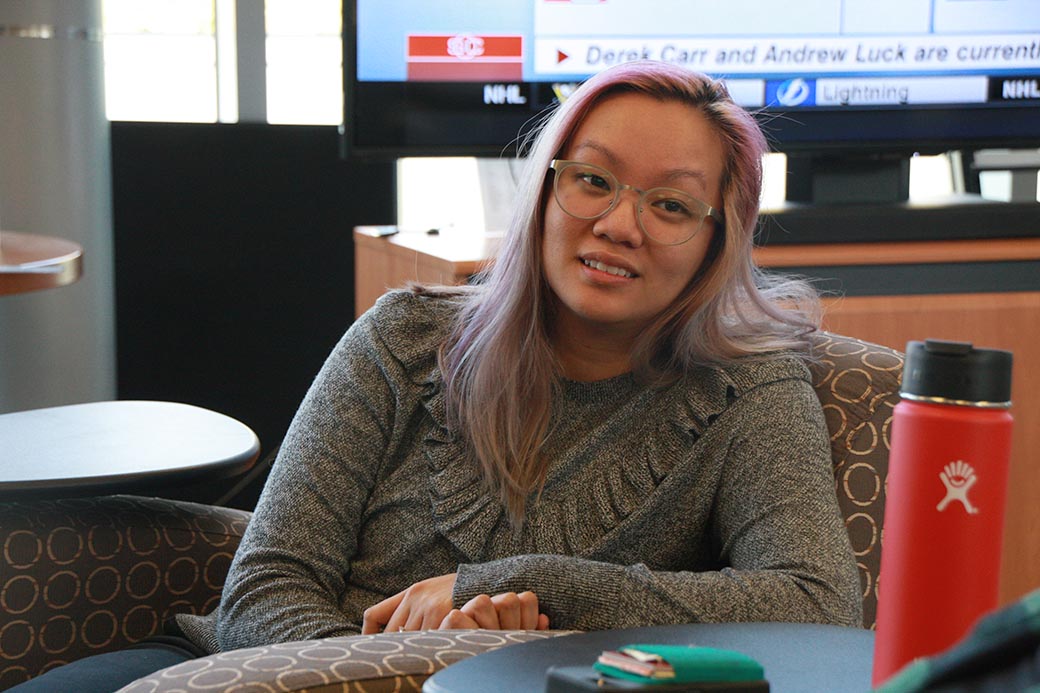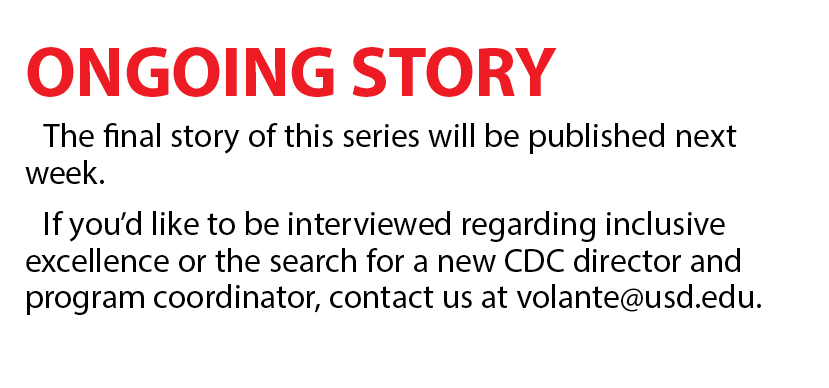
Former CDC coordinator shares concerns, reasons for leaving
By Cheyenne Alexis and Ally Krupinsky
Students in the Center for Diversity & Community (CDC) are hoping for a positive semester this spring after a “tumultuous” fall.
One source of student concern was Lena Tran’s departure from the CDC’s intercultural program coordinator position.
“Everyone was like, ‘She made the CDC what it is’ and like, ‘What are we going to do without her?’” said Micci Abbott, a senior sport marketing and media major.
Tran cited several reasons for her resignation, including conflict with the CDC’s former director, Adetokunbo Oredein; frustration with the mishandling of her complaints and a need to preserve her personal well-being.
“I fought tooth and nail, tooth and nail, for our students ’til the end. And I think there are things that aren’t being discovered or talked about,” she said. “That’s where I worry about the future of how we value a population of students – that we have to understand that there are long-term consequences to this, not short-term.”
Oredein, who was contacted by The Volante prior to the first story in this series, declined to comment.
Conflict
Tran said she and Lamont Sellers, associate vice president for diversity, worked “really well” together when Sellers was the director of the CDC.
“I believe that things changed when he… became the vice president for diversity,” Tran said.
Sellers was promoted to the position in October 2016. Tran said she applied for the CDC director position, but wasn’t hired.
 Before Oredein was hired in March 2017, Tran said she stepped up in the CDC.
Before Oredein was hired in March 2017, Tran said she stepped up in the CDC.
When Oredein accepted the position as the CDC director, Tran said she had a positive first impression of him.
“I thought at first he was very social, very nice, and I was looking forward to working with him and to bounce ideas,” she said.
After a few months of working together, Tran increasingly became concerned with Oredein’s behavior.
“I felt like my work environment was hostile,” she said.
Instances that contributed to the “hostile” work environment included Oredein calling Tran “Ling Ling” and taking and posting photos of her on his personal Facebook page without her consent, she said.
She brought her concerns to Sellers in May 2017.
Tran and Sellers texted back and forth in May regarding the “Ling Ling” comments. Tran shared screenshots of the texts with The Volante.
Sellers said he couldn’t comment on the issues.
“Those are personnel issues,” he said. “If she shared the information, that’s her prerogative, but I can’t go into it.”
Tran said nothing was ever done about the comments.
“You have to keep talking about it, you have to keep talking about it and then it seems like, ‘Oh she’s making a big deal of it.’ No, I’m not,” Tran said.
In addition to her own negative experiences in the CDC, Tran was concerned for students. In one incident, which was covered in a previous story published by The Volante, Oredein allegedly touched a student’s hair and repeatedly made remarks about her appearance.
Multiple students interviewed by The Volante said they stopped going to the CDC because they no longer felt comfortable there. Their experiences are detailed in the first part of this ongoing story.
Tran went through a formal complaint process against Oredein in September 2017.
After sending an email to USD human resources Sept. 1 and receiving a reply from Carl Gutzman, South Dakota Board of Regents human resources representative, Tran said there was no follow-up from human resources or her supervisors.
Khara Iverson, director of Equal Opportunity and chief Title IX officer, said employees can become “frustrated” when their concerns aren’t addressed.
“If correct action is taken (against another employee), there may be a work improvement plan that is put in place,” she said. “However, the person bringing that concern or complaint would not necessarily be notified of that plan.”
Iverson handles Title IX and Equal Opportunity complaints, and any management issues are dealt with by human resources. Both of these complaint types fall under Title IX’s 1-18 policy on Human Rights Complaint Procedures.
“If there is a policy violation under Equal Opportunity or Title IX and that person is employed by the university, I would contact the institutional officer that sits over that person to let them know about that finding,” she said.
According to the email, Tran was informed that Oredein asked for a female graduate assistant’s phone number during business hours and later took her out on a dinner date.
Iverson said romantic relations between faculty, staff and students fall under the 1-23 policy regarding consensual relationships.
“Anybody that would have direct control or any type of authority over another person, that would be deemed non-consensual,” she said.
After seeing no progress was made regarding her concerns, Tran said she suffered a “mental breakdown” from her job.
“I thought we had a relationship of credibility, trust, but also professionalism. Kim Grieve agreed with me, what I was going through was shitty,” she said. “And she agreed, and she did nothing.”
Grieve was unable to comment on an “employee issue.”
‘Willing to stay’
Abbott said she was surprised Tran resigned.
“Everyone kind of used Lena as the heart of the CDC for the longest time,” she said.
Tran said she wasn’t given an exit interview.
“Lamont and Kim never really sat down and talked to me of why I was leaving or try to talk to me about, you know, ‘Is there something we can do for, you know, work this out?’” she said.
Two days before her last day, Tran said she was approached by Grieve.
“I finally had it when Kim Grieve came up to me after the students had been really upset knowing that I was leaving, to tell me basically to be silent, ‘Don’t talk about you leaving’ and (she) told me to go home,” she said. “I didn’t feel right.”
After talking with multiple colleagues about students’ concerns regarding her absence, Tran said she was advised to rescind her resignation.
“I wrote an email to Kim, asking, telling her, (I’d be) willing to rescind my resignation because I realized leaving has greater impact and affect on our students than if I were to stay and work this out with them,” she said. “I did that because I was willing to put my dignity and my, you know my ego, essentially, aside for our students. For the future of this department that I was proud of, to have built, or be a part of and knowing (of) the emotional distress of our students. I was willing to stay. Kim said no.”
Tran shared the emails and text messages between her and Grieve with The Volante.
Grieve said she couldn’t comment on Tran’s rescindment.
“It’s an employee issue,” she said. “I can’t have a response to that.”
Sellers said he wasn’t aware of Tran’s rescindment, and didn’t have a reaction to it.
A ‘rocky’ transition
Olivia Mann, a senior criminal justice and sociology double major, said losing Tran “hurt” the student organizations and the CDC community.
“There were very concrete impacts there,” she said. “The transition was rocky, so that made it hard to sometimes feel like the space was still a home.”
Lynae Tucker, a former graduate assistant who worked under Tran in the CDC, said she “loved” working with Lena.
“She gave me a lot of autonomy and a lot of trust and… she challenged me a lot,” she said. “I couldn’t have asked for a better GA position while I was working under Lena.”
In terms of student organizations, Kevin Nam, an economics and computer science double major, said the CDC had somewhat of a setback when Tran left.
“I think she did a really great job creating the CDC as a community,” he said.
Abbott said Tran did a lot to help the students.
“She’s always looking out for the students and always going above and beyond to help whoever she can,” she said.
Though she doesn’t work for the CDC anymore, Tran said students still come to her with questions.
“I realize that I protect the university by giving them the answers when they need help, because I’m not in that job anymore,” she said. “By me giving it to them, it protects what the real underlying issue is, and they need to hire people and they need to invest in good people and not just hire whoever.”
Tran said despite its end, she’s proud of her time as intercultural program coordinator.
“The work that I put into the university, I stand by it,” she said. “It was all done through honesty, passion and love.”
